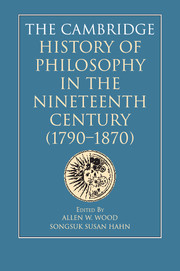Book contents
- Frontmatter
- Contents
- Contributors
- Preface
- Abbreviations
- Introduction
- I Philosophy in the Nineteenth Century
- 1 The Kantian Aftermath
- 2 The Social Conditions of Philosophy in the Nineteenth Century
- 3 The Unity of Reason and the Diversity of Life
- II Logic and Mathematics
- III Nature
- IV Mind, Language, and Culture
- V Ethics
- VI Religion
- VII Society
- VIII History
- References
- Index
- References
2 - The Social Conditions of Philosophy in the Nineteenth Century
from I - Philosophy in the Nineteenth Century
Published online by Cambridge University Press: 05 December 2012
- Frontmatter
- Contents
- Contributors
- Preface
- Abbreviations
- Introduction
- I Philosophy in the Nineteenth Century
- 1 The Kantian Aftermath
- 2 The Social Conditions of Philosophy in the Nineteenth Century
- 3 The Unity of Reason and the Diversity of Life
- II Logic and Mathematics
- III Nature
- IV Mind, Language, and Culture
- V Ethics
- VI Religion
- VII Society
- VIII History
- References
- Index
- References
Summary
The social conditions for doing philosophy in the nineteenth century remain, by and large, the same social conditions for doing philosophy in the twentieth and, so far, also in the twenty-first century: Universities remain for all practical purposes the sole place where philosophy of any quality is pursued, and one must have an advanced degree in order to gain employment in such universities. Unlike some novelists, philosophers cannot live off the royalties from their writings, and they are only rarely put to work in non-university research units. (Perhaps the growth of “ethics advisers” will change that, but it is unlikely.) In the nineteenth century, there were, of course, several outstanding exceptions to this rule. Kierkegaard was not a member of a university; nor were Schopenhauer, Marx, or Mill. (Nor was Emerson, although it is more controversial to classify him as a philosopher.) Nietzsche started out in the university but not as a philosopher, and his philosophical works (with the exception of The Birth of Tragedy) came to be written outside the university altogether. All of them, though, had some exceptional circumstances that enabled them to do this. Moreover, each (with Mill the exception) had to fight against the familiar prejudices of university philosophers that those writing outside the university failed to exercise the rigor and standards enforced within the philosophical faculties of the university. Each failed to get recognition from university professors of philosophy until late in life or after his death. In the twentieth century, philosophers such as Sartre, Simone de Beauvoir, and Albert Camus managed to have careers outside the university, and Bertrand Russell had a long non-university career, but they are unusual exceptions. Part of Martin Heidegger’s career was spent outside the university, but this was because of his rather unfortunate political involvements.
- Type
- Chapter
- Information
- Publisher: Cambridge University PressPrint publication year: 2012

